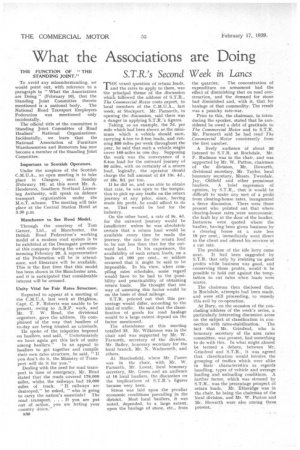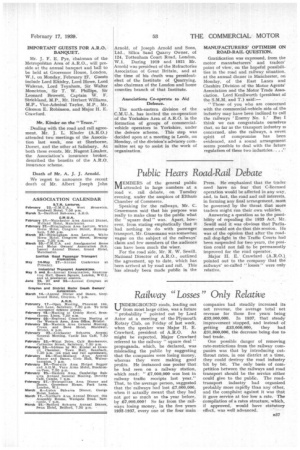What the Associations are Doing
Page 46

Page 47

If you've noticed an error in this article please click here to report it so we can fix it.
THE FUNCTION OF " THE THE FUNCTION OF " THE
STANDING JOINT." S.T.R. 's Second Week in Lancs
To avoid any misunderstanding, we would point out, with reference to a paragraph in "What the Associations are Doing" (February 10), that the Standing Joint Committee therein mentioned is a national body. The National Road Transport Employers Federation was mentioned only incidentally.
The official title of the committee is Standing joint Committee of Road Hauliers' National Organizations. Incidentally, we learn that the National Association of Furniture Warehousemen and Removers has now become a member of the Standing Joint Committee.
Important to Scottish Operators.
Under the auspices of the Scottish C.M.U.A., an open meeting is to take place in Glasgow, next Sunday (February 19); at this event Mr. A. Henderson, Southern Scotland Licensing Authority, will speak on defence transport organization under the M.o.T. scheme. The meeting will take place at the Central Station Hotel at 3.30 p.m.
Manchester to See Road Model.
Through the courtesy of Tom Garner, Ltd., of Manchester, the British Road Federation's working model of a modern road system is to he exhibited at the Deansgate premises of this company during the week commencing February 20. A representative of the Federation will be in attendance, and literature will be available. This is the first time that this model has been shown in the Manchester area, and it is anticipated that considerable • interest will be aroused.
Unity Vital for Fair Rates Structure.
Expected to appear at a meeting of the C.M.U.A. last week at Brighton, Capt. C. F. Roberts was unable to be present, owing to A.R.P. work, and Mr. T. W. Read, the divisional organizer, gave the address. He complained of the way that hauliers of to-day are being treated as criminals.
He spoke of the iniquities imposed on hauliers, and said, " Unfortunately we have again got this lack of unity among hauliers." In an appeal to hauliers to get together and compile their own rates structure, he said, "If you don't do it, the Ministry of Transport will do it for you."
Dealing with the need for road transport in time of emergency, Mr. Read stated that the roads covered 179,000 miles, whilst the railways had 19,000 miles of track. " If railways are destroyed," he asked, "who is going to carry the nation's essentials? The road transport. . . If you are put out of action, you are letting your country down."
1336
THE vetted question of return loads, and the rates to apply to them, was the principal theme of the discussion which followed the address of S.T.R., The Commercial Motor costs expert, to local members of the C.M.U.A., last week, at Stockport. Mr. Farnorth, in opening the discussion, said there was a danger in applying S.T.R. 's figures.
Taking, as an example, the 7d. per mile which had been shown as the minimum which a vehicle should earn, carrying 4-ton to 5-ton loads, and running 800 miles per week throughout the year, he said that such a vehicle might cover 160 miles in one day. Supposing the work was the conveyance of a 5-ton load for the outward journey of 80 miles, with no certainty of a return load, logically, the .operator should charge the full amount of 13s. 4d., or 18s. 8d. per ton, If he did so, and was able to obtain that rate, he was open to the temptation to pick up any traffic on the return journey at any price, since, having made his profit, he could afford to do so. That would be had for the industry. , On the other hand, a rate of 9s. 4d. for the outward journey would be insufficient unless he was absolutely certain that a return load would be available every time he made the journey, the rate for the return load to be not less than that for the out ward load. In his experience, the availability of such return loads, on a basis of 100 per cent., so seldom occurred that it might be said to be impossible. In his view, when compiling rates schedules, some regard would have to be had to the possibility and practicability of obtaining return loads. He thought that one way of assessing this factor would be on the basis of dead mileage.
S.T.R. pointed out that this percentage would differ, according to the kind of traffic. He said that the classification of goods for road haulage would to a large extent depend on the factor mentioned.
The attendance at this meeting totalled 33. Mr. Wilkinson was in the chair and was supported by Mr. W. Farnorth, secretary of the division, Mr. Bailey, honorary secretary for the local branch, Mr. N. Wadsworth, and others.
At Macclesfield, where Mr. Foster was in the chair, with Mr. W. Farnorth, Mr. Lovat, local honorary secretary, Mr. Green and an audience of 16 local hauliers, the discussion on the implications of S.T.R.'s figures became very keen.
Stress was laid upon the peculiar economic conditions prevailing in the district. Most local hauliers, it was noted, depended, to a large extent, upon the haulage of stone, etc., from the quarries. The concentration of expenditure on armament had the effect of diminishing that on road construction, and the demand for stone had diminished and, with it, that for haulage of that commodity. The result was a panicky rate-war.
Prior to this, the chairman, in introducing the speaker, stated that he considered he owed a debt of gratitude to The Commercial Motor and to S.T.R. Mr. Farnorth said he had read The ,Commercial Motor consistently from the first number. • A lively audience of about 30 listened to S.T.R. at Rochdale. Mr. F. Rudman was in the chair, and was supported by Mr. W. Patton, chairman of the division, Mr. Howarth, divisional secretary, Mr. Taylor, local honorary secretary, Messrs, Tweedale, Jay, Oldfield and other prominent hauliers. A brief expression of opinion, by S.T.R, that it would be difficult to make any sort of a profit from clearing-house rates, inaugurated a fierce discussion. There were those present who pointed out that where clearing-house rates were uneconomic, the fault lay at the door of the haulier. Instances were quoted where the haulier, having been given business by a clearing house at a rate less 10 per cent., immediately went direct to the client and offered his services at a cut rate.
The problem of the idle lorry came next. It had been suggested by S.T.R. that only by insisting on good profits while business was good, and conserving those profits, would it be possible to hold out against the temptation to cut rates when loads were scarce.
The chairman then disclosed that, in Rochdale, attempts had been made, and were still proceeding, to remedy this evil by co-operation.
At Bury, on the occasion of the concluding address of the week's series, a particularly interesting discussion arose on the subject of classification in connection with rates-stabilization. The fact that Mr. Grindrod, who is honorary secretary of the area rates committee, was present, had something to do with this. In what might almost be termed a debate, between Mr; Grindrod and S.T.R., it was agreed that classification would involve the grouping of traffics which were alike in their characteristics as regards handling, types of vehicle and average loading and unloading conditions. A further factor, which was stressed by S.T.R., was the percentage prospect of return loads. Mr. Etheridge was in the chair, he being the chairman of the local division, and Mr. W. ,Patton and Mr. Howarth were also among those present. IMPORTANT GUESTS FOR A.R.O. BANQUET.
Mr. J. F. E. Pye, chairman of the Metropolitan Area of A.R.O., will preside at the annual banquet and ball to be held at Grosvenor House, London, W.1, on Monday. February 27. Guests include Lord EItisley, Lord Howe, Lord Waleran, Lord Teyntiam, Sir Walter Monekton, Sir T. W. Phillips, Sir Leonard Browett, Captain W. F. Strickland, M.P., Mr. Herbert Williams, M.P., Vice-Admiral Taylor, M.P., Mr. Gleeson E. Robinson, and Major H. E. Crawfurd.
Mr. Kinder on the "Truce."
Dealing with the road and rail agreement, Mr. J. L. Kinder (A.R.O.) attended two meetings of the Association last week, one at Slierborne, Dorset, and the other at Salisbury. At both these events, Mr. Nugent Linaker, the Association's insurance broker, described the benefits of the A.R.0_ insurance scheme.
Death of Mt. A. J. J. Arnold.
We regret to announce the recent death of Mr, Albert Joseph John Arnold, of Joseph Arnold and Sons, Ltd., Silica Sand Quarry Owner, of 124, Tottenham Court Road, London, W.I. During 1919 and 1921 Mr. Arnold was president of the Refractories Association of Great Britain, and at the time of his death was presidentelect of the Institute of Quarrying, also chairman of the London and home counties branch of that Institute.
Associations Co-operate to Aid Defence.
The north-eastern division of the C.M.U.A. has invited the co-operation of the Yorkshire Area of A.R.O. in the formation of groups of commercialvehicle operators in Yorkshire, under the defence scheme. This step was decided upon at a meeting in Leeds, on Monday, of the division's advisory committee set up to assist in the work of organization. MANUFACTURERS' OPTIMISM ON ROAD-RAIL QUESTION.
Gratification was expressed, from the motor manufacturers' and traders' point of view, on the hopeful possibilities in the road and railway situation, at the annual dinner in Manchester, on Monday, of the East Lanes and Cheshire Division of the Motor Agents' Association and the Motor Trade Association. Lord Kenilworth (president of the S.M.M. and T.) said:— " Those of you who are concerned with the commercial-vehicle side of the industry may have been inclined to call the railways Enemy No. I.' But I think we can congratulate ourselves that, so far as the transport industry is concerned, also the railways, a sweet spirit of compromise has been evidenced, and a sound arrangement seems possible to deal with the future regulation of these two industries.......




















































































